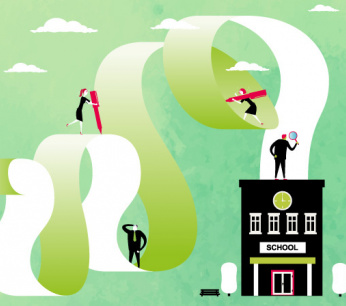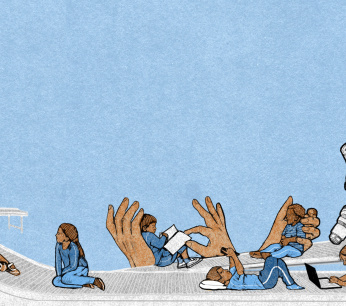'Education party' D66 is bleeding for raised expectations
With a massive education strike on March 15, political The Hague will feel the pressure build up. While the teacher shortage is getting more poignant every week, the question arises: when will the self-proclaimed education party D66 open the coalition agreement for more investment?
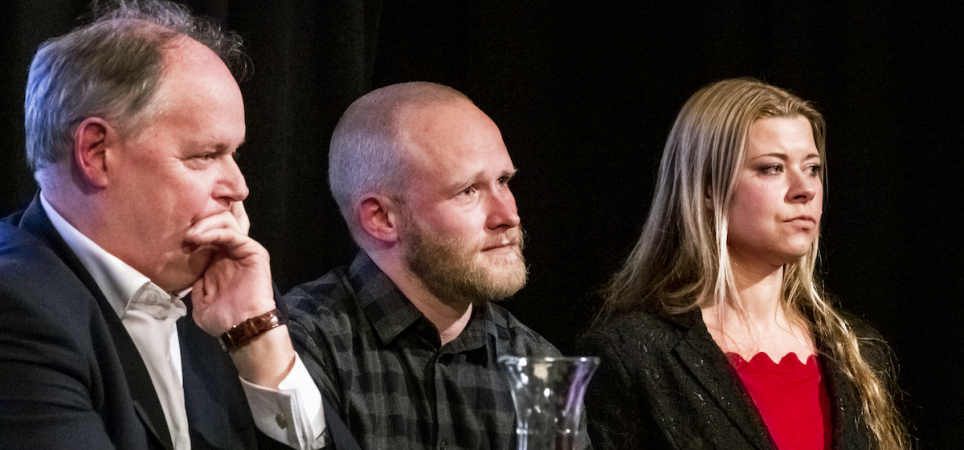
Image: Angeliek de Jonge
In the packed room of the Dudok café in The Hague, a heartfelt cry was heard. It happened during a political debate evening in late January organized by the AOb, with the telling motto "Education is drowning!". D66 Member of Parliament Paul van Meenen was targeted by fellow parliamentarians from opposition parties. Why doesn't D66 do more for education? “We'll get the chestnuts out of the fire for education in the coalition!”, Van Meenen responded grimly.
Yet the self-proclaimed education party of the Netherlands is not benefiting from this for the time being. Opinion polls point to an electoral decline of D66, which joined the third Rutte cabinet eighteen months ago with 19 seats. Coalition members VVD and CDA also fall in the polls, by the way. below AObmembers, the trend is even more troubling for D66, as it turned out a survey which Regioplan implemented at the end of November. While the party was the most popular in the previous elections, its support has since halved from 28 percent to 13 percent. A large part of the then D66 supporters, almost half, still have doubts.
AObmembers who turn their backs on D66 often turn to GroenLinks. The party that declined at the last minute for a place in the cabinet and opted for the opposition
Which also turns out: AObmembers who turn their backs on D66 often turn to GroenLinks. The party that declined at the last minute for a place in the cabinet and has since then under the leadership of Jesse Klaver has been attacking the cabinet - and is growing in the polls. Opposition parties may well play an important role after the provincial council elections on 20 March, if the coalition loses its majority in a new Senate.
With a nationwide, education-wide strike approaching on March 15 - a historic peak of two years of campaigning - the pressure on the coalition is increasing. Every week the teacher shortage becomes more visible and poignant. The eyes are primarily focused on D66: what can we expect from the 'educational party'?
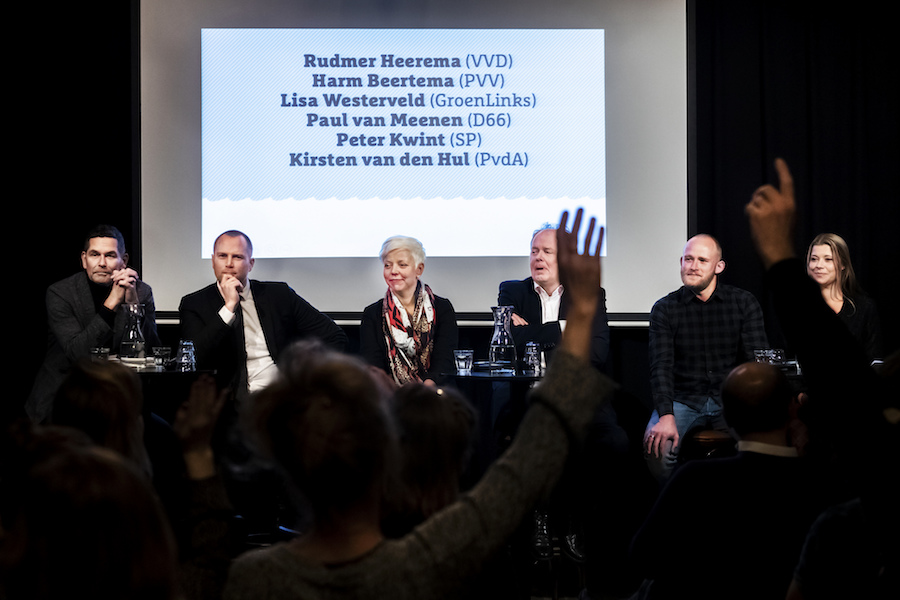
The AOb-education debate in The Hague at the end of January. Image: Angeliek de Jonge
Compromise
The first reflex was mainly: underline what the coalition has already done. The feat of arms is that the current cabinet in absolute terms invests more in education than previous cabinets. Money is earmarked for pre-school and early childhood education, technical education at VMBO, halving of tuition fees for first-year students in higher education (plus the second year at teacher training college). Then there is the much-discussed 270 million for salary improvement of teachers in primary education and for workload relief, an amount rising to 430 million in 2022. Then the cabinet will most likely no longer be there, because in March 2021 the Netherlands will again elect a new House of Representatives.
Nobody doubts that D66 has advocated education in the cabinet negotiations, says Arnold Jonk, director of the Between Amstel en IJ foundation for public primary education. He is both critical and positive about the party, he emphasizes. There is no doubt that more money will be spent on education during this cabinet term than during previous cabinets. Still, the question is whether this is attributed to D66 in education, says Jonk. “By taking action, people in education have achieved something themselves and I think that feeling is justified. Those campaigns played a very important role. ”
The question is whether people in education attribute the salary increase in primary school to D66. By taking action they have achieved something themselves, and I think that feeling is justified
Under disappointed AObmembers are accused that D66 has not kept his promises. In its election program, which was already printed before the education campaigns started, the party turned out big with a package of 3,8 billion euros in investments. Former party leader Alexander Pechtold, who has since been succeeded by Rob Jetten, published in the Algemeen Dagblad one month before the elections. record that his party wanted to allocate no less than 4,5 billion. "Most teachers are not the first to complain about their salary, but about not enough time and space for their profession," he said. 'If we make the profession attractive, it will have an effect.'
Of the four billion from the election programme, D66 claimed when presenting the coalition agreement, half has been realised. And it still sounds that way: an additional 1,9 billion on a structural basis. D66 Member of Parliament Jan Paternotte recently mentioned 7,5 billion 'extra for education', whereby he - presumably - makes a sum of four years.
https://twitter.com/jpaternotte/status/1100728370248237056
If you look at the OCW budget, which includes the coalition agreement, you get a slightly different picture. It is more broadly about 'education, research and innovation'. A grab bag of items, in which, for example, are also counted:
- Research / innovation (360 million in 2019, 400 million structural, of which more than a third is in the budget of Economic Affairs)
- Closing previous deficits (415 million in 2019, 183 million structural)
- Tuition fee reduction in higher education (165 million in 2019, 170 million structural)
- Social service time (60 million in 2019, 100 million structural), money intended for social organizations that offer 'traineeships/ job shadowing'
- Culture and historical-democratic awareness (50 million in 2019, 80 million structural), money intended for cultural organizations and funds, among others
Moreover, there is also money for media (investigative journalism) and heritage. And on balance, not 1,9 billion will be structurally added, but less. There is also an 'efficiency discount' open, a heritage from the previous VVD-PvdA cabinet. Last Budget Day it turned out that there was a new one setback looms from 2020, which has yet to be completed in the upcoming spring note.
If you look specifically at employment conditions, work pressure and equal opportunities, then this is the picture: 757 million extra will be invested this year. Structurally this involves one billion euros. This includes the second tranche of the workload money that still has to be released after an interim evaluation. A much-needed catch-up, the AOb right away, but it is not enough.
D66 makes a creative sum, says GroenLinks MP Lisa Westerveld. “By using big words you underestimate teachers and other teaching staff, they will certainly get through that. I think people have become disappointed because of that. ”
Voters in the Netherlands are really willing to accept compromises, if a party takes them along
"Voters do understand that parties have to compromise when they are going to govern," says Tom van der Meer, professor of political science at the University of Amsterdam. “Voters in the Netherlands are quite willing to accept compromises if a party takes them along. It is striking how D66, like the CDA, for example, has defended the coalition agreement very strongly from the start. That entails a risk, because you defend a compromise and therefore also the points on which you had to give in. What you should do is also show what you would have liked differently. Then you include your voters in the compromise. ”
To hold
Retaining voters is no mean feat in the fragmented political landscape. This is extra complicated for D66, argues Van der Meer. “You have roughly a few political blocs in the Netherlands: the left, with parties such as GroenLinks, PvdA, SP and D66. And on the right parties such as VVD, CDA, PVV and D66. D66 is in between. The party is attractive to voters from both camps, which means that they can grow rapidly in the opposition. But if they are going to rule, it will be with the left or with the right and then they will very quickly lose part of their supporters. That is why it is often said at D66: to rule is to halve. ”
History speaks volumes in that regard. After participating in the short-lived Van Agt II cabinet, D66 fell from 1982 to 17 seats in 6. After twelve years of opposition (the CDA era with Ruud Lubbers as prime minister), D66 tried again in the two purple cabinets under PvdA prime minister Wim Kok. D66 started that period with 24 seats, its largest number of seats ever, but saw the popularity drop to 14 and 7 seats in two elections in 2002. A year later, after new elections, D66 joined the center-right cabinet Balkende with six seats. II. Three years later, D66 halved to three seats. In eleven years of opposition, the party under the leadership of party leader Pechtold grew back to 19 seats. And then they joined the current cabinet.
Unlike previous cabinets, the current coalition of VVD, CDA, D66 and CU felt the economic wind at its back from the start. But governing in times of prosperity also has its dilemmas. For example: what do you say to sectors such as education or healthcare, which are plagued by staff shortages and high work pressure, while you have money left over in the national budget? Guarding the treasury is more difficult in times of economic prosperity, said Finance Minister Wobke Hoekstra last fall in the Volkskrant. He is proud of it: the cabinet has noted a plus on the national budget and can reduce the national debt.
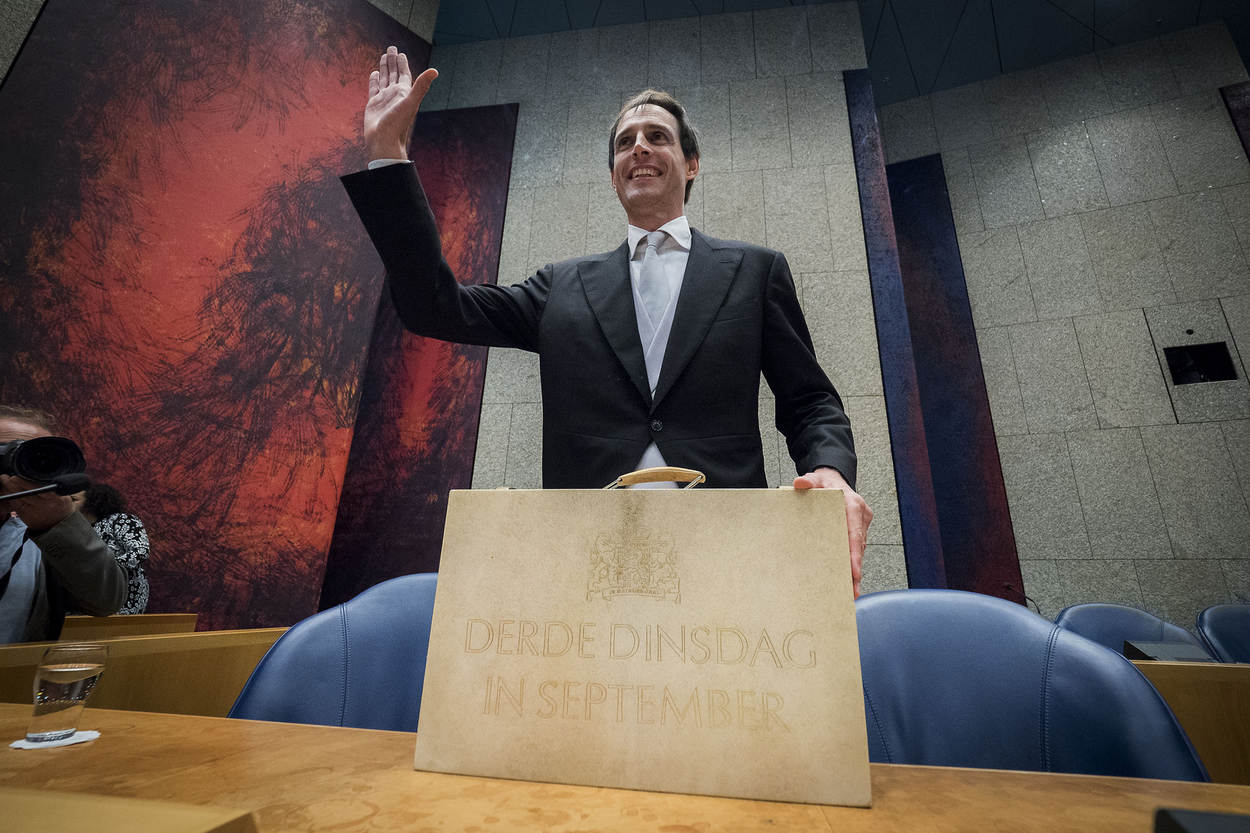
Minister of Finance Hoekstra during Prinsjesdag in September 2018. Image: Central government, Valerie Kuypers
While the Netherlands is in a better position, education expenditure as a share of gross domestic product (GDP) is shrinking from 5,2 to 5 percent. Minister Slob reversed that decline an interview with the Education Magazine with “a little flattening”: it is a matter of making choices. Ten years ago layers of education expenditure still at 5,5 percent of GDP.
In the meantime, the teacher shortage is becoming more acute every week. Primary schools are forced to send classes home, introduce a four-day working week. Secondary schools have to remove subjects from the lesson table in the absence of a teacher. Or a class five hours in a row plan for a shortage course, because there is still just a teacher.
Insidious consequences
That is the most visible tip of the iceberg. Below the surface, teachers have been seeing the insidious consequences of the teacher shortage for much longer: classes that are merged because there is no replacement for a sick colleague, teaching assistants or interns who run a group independently, subject teachers who are forced to fill gaps in the class schedule without authorization, teachers who are hired through expensive employment agencies.
Education minister Arie Slob sent in January new figures about the teacher shortage to the House of Representatives, which again underline the seriousness. Add to this the daily impact of appropriate education, which still remains almost five years after its introduction on all sides. Instead of the smaller classes that Pechtold predicted for education two years ago, many teachers experience the opposite in practice.
If people think the education policy is insufficient, you will be held accountable for it. And if you like to call yourself the 'educational party', perhaps harder than other parties.
“A coalition party is automatically identified with government policy,” says school administrator Jonk. “If people find education policy insufficient, you will be judged on it. And if you like to call yourself the 'educational party', perhaps harder than other parties. It is a mechanism that does not only apply to D66: when you are in government, you are not easily rewarded on the basis of what you have already done, but are held accountable for what you have not yet done and what people would like from you. want."
Take the proposed abolition of dividend tax, a proposal with a clear VVD signature. He met so much public resistance that Prime Minister Mark Rutte eventually had to withdraw him. A victory for opposition parties, which made the struggle a spearhead. But the two billion euros involved will still go to the business community.
“It would have been nice to say: part of this will go to the public sector," said GroenLinks MP Westerveld. "There was a great opportunity for D66 to put pressure on the cabinet. Voters see that the current investments are not sufficient and see that the problems with the teacher shortage are only increasing. It is difficult to maintain that you are the education party if you do not do enough for education. I then think: come on, stick your neck out a little more within the coalition.”
It is difficult to maintain that you are the education party if you do not do enough for education. I then think: come on, stick your neck out a little more within the coalition
"Listen, it's very simple: GroenLinks has never spent a euro on education, never in their entire existence," says D66 MP Paul van Meenen. “The same applies to the SP. I am not saying that to be silly, but it is good to say that clearly. ”
In the opposition it is easy to shout, or at least: a lot easier. At times, disappointment - or irritation - can still be felt about the fact that GroenLinks dropped out of the formation. That party entered the elections with 2,8 billion euros in education investments in its programme. Van Meenen: “I wish we could have worked together a bit more in the formation. D66 is the party that wants to invest the most in education, GroenLinks a reasonable second. It would have been nice if we could have ruled together, but that didn't work out."
Political scientist Van der Meer: “If they wanted to govern, it would have been quite attractive for GroenLinks to govern in a coalition with D66. Conversely, that applies much more. I understand very well that then D66 leader Pechtold was bitter about this when GroenLinks dropped out. It would have been an ideal situation for D66 to govern together with GroenLinks and the VVD and thus cover both flanks. ”
GroenLinks MP Westerveld responds: “It has sometimes been painted that we would not be serious about the negotiations, but we were. I well remember the disappointment in the group when Jesse informed us that GroenLinks would definitely not be joining the government. We really felt that there was too little in it for us. That feeling was strengthened when I read the coalition agreement."
Performance box
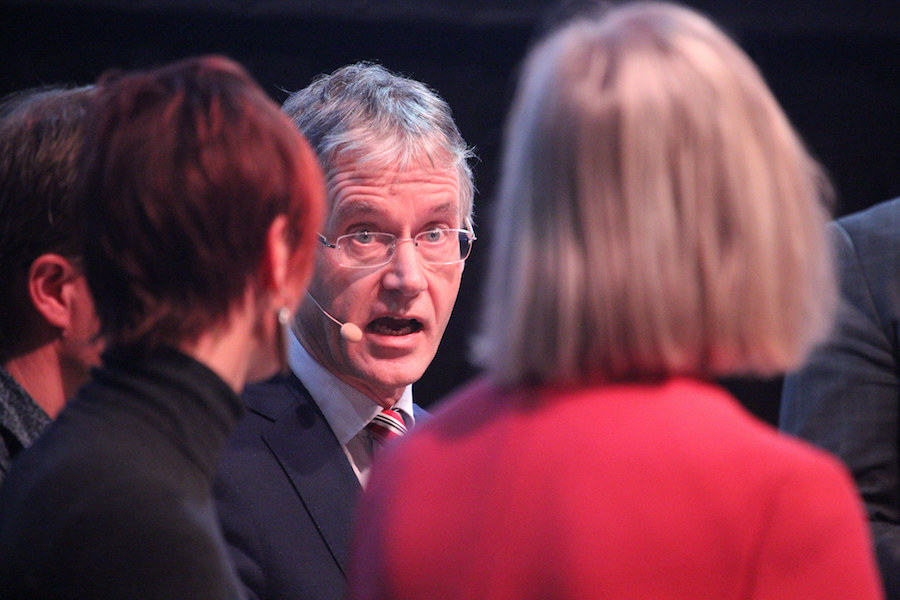
Minister Arie Slob during a meet-up on November 29, 2017. Image: Arie Kievit
The coalition has not sat on its hands, says Van Meenen. Education minister Slob filled in last autumn in haste the subsidy pot for supervision of lateral entrants when the bottom had already come into view. He applied a trick by using money that would be left over from another jar within the OCW budget this year. And in February 2018, the cabinet agreed to part of the promised workload money for primary education forward after sustained actions in education. Last night, the minister announced a second cash move.
At the end of last year, D66 and CDA made an attempt to find new money for teachers' salaries. During the discussion of the education budget aroused a message NOS.nl high hopes for "extra money", but the final proposal turned out to be less certain. The motion asked Minister Slob to see whether - from 2020 - money for salary improvement can be withdrawn from the so-called 'performance box', a fund for educational innovation. Money of which teaching staff has also been appointed at the moment, these parties also know that. The proposal received a majority thanks to support from the opposition, but also drew ridicule from the parties. 'A dead sparrow', is what MP Eppo Bruins of coalition partner ChristenUnie called it.
Control
For the time being, attempts to find money are limited to shifting items in the education budget itself. This keeps D66 neatly within the limits of the coalition agreement. For ideas without a concrete price tag, the party regularly seeks cooperation with the opposition outside the coalition.
For example, Van Meenen came up with the proposal to shift the flow of money from the government from boards to schools. A 'thought experiment' that raises quite a few eyebrows. It's an idea that would revolutionize education funding - and one that raises a lot of questions about the legal, logistical and financial implications. He got a majority a motion to have Minister Slob investigate his idea. Thanks to support from the opposition; coalition members VVD, CDA and CU voted against. A diversion?
Tuition money must end up in the classroom and that is still far too often not the case, just look at the reserves. So I said, let's go crazy and take the money directly to the schools
Van Meenen: “Education money must end up in the classroom and that is still far too often not the case, just look at the reserves. So I said, let's go crazy and take the money directly to the schools. The school on the corner of the street is where education takes place, but the power lies elsewhere: with the board. I want to return control to the school. And the quickest way is through the greatest means of power, which is money. I think a lot more money will end up in the classroom, the way schools like to see it."
Are school leaders waiting for this?
Van Meenen: "I understand that school leaders are not waiting for more hassle, but schools can work together in cooperatives. This way they can share administration, support and management, but they retain their say."
School administrator Jonk has mixed feelings about it. “I have always thought that there is something crazy in the Dutch education system between the school and the school board. The social legitimacy lies at the level of the school: that's where the teacher works, that's where the pupil goes. But the legislation is strongly focused on the school board. That creates a tension. D66 wants to give schools and teams more say, I think that's good. The right of consent in broad lines of the budget also comes from that tube. But if Van Meenen suggests that a lot of money will be released by shifting the money flows from board to school, then you are organizing the frustration of three years from now. Because that is really nonsense, the overhead in primary education is very low. It will not get smaller in another model. ”
If D66 suggests that a lot of money will be released by shifting the money flows from the board to the school, then you are organizing the frustration of three years from now.
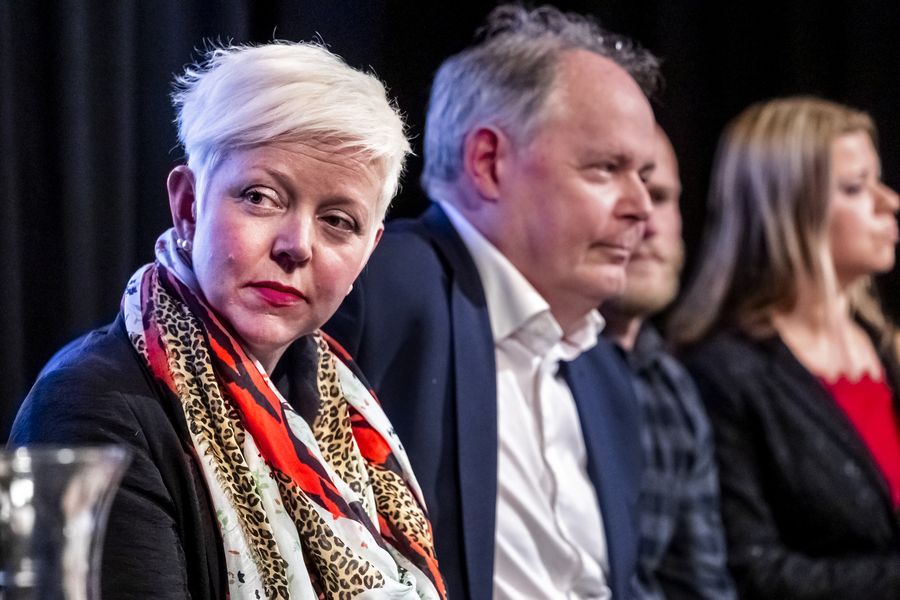
PvdA MP Van den Hul, for D66 MP Van Meenen. Image: Angeliek de Jonge
In the meantime, Van Meenen does not miss an opportunity to say that more money should be spent on education, even in the coming years. “We have made proposals to allow the money from the performance box to go towards salary improvement. It doesn't stop there. By the way, it is not only about material things. Just think of the right of consent on the main lines of the budget or the abolition of the arithmetic test. These are also things with which we want to empower teachers and make the profession more attractive. Just like smaller classes and fewer hours for teachers. ”
Smaller classes and fewer hours? Don't you need more teachers for that?
Van Meenen: “That depends on how you look at it. From an international point of view, our teachers teach many more hours than in other countries. Students also receive much more lessons. It is very questionable whether you should not give more space to schools to partly offer education in a different way. ”
But what can we expect in concrete terms from D66 during this cabinet term?
Van Meenen: “I cannot answer that concretely. We have to conclude that the teacher shortage is a problem that has been completely neglected for ten years. We can hold previous cabinets, up to and including the last Balkenende cabinets, responsible for this. We will take every opportunity to invest. We are looking beyond just this cabinet term. In the previous elections we had 3,8 billion in the program, half of which we achieved. In the next elections, I have a feeling for the agenda that the AOb has laid down a four billion education pact. I think there is still more possible. ”
Elections
An investment program for education as a whole will require four billion euros, calculated the AOb earlier this year. The union is asking politics to come up with a coherent multi-year plan that looks beyond the short term. The teacher shortage and the high workload - resulting in many dropouts with burnout, which in turn reinforces the shortage - affect the quality of education and that is a social problem. A call from GroenLinks and the PvdA to come up with a long-term delta plan, 'in which various measures are viewed in conjunction', was previously voted out by the coalition, including D66. With an action week this month and an education-wide strike on 15 March, from primary school to university, the unions want to keep the pressure on the boiler.
More money really needs to be added, says school administrator Jonk. Unlike many other boards, he pays teachers go on strike through. “I see how little support teachers have, how large the groups are, how difficult it is to find teachers. It is very thin and people see that every day around them. If you look around you, there can only be one conclusion: more must be invested in education."
The coalition agreement has already been discussed before, with success. What can education party D66 do? Political scientist Van der Meer: “Voters who have since switched to another party, such as GroenLinks, cannot simply be returned. They must then have a reason to leave GroenLinks. The main thing for D66 is that they continue to profile themselves. That they make visible what they want to do for education and that they show that it is not boiler music. In Dutch political culture, this battle often takes place behind the scenes, with the idea that you shouldn't let the boat shake too much, but that a coalition should be given a punch. ”
The main thing for D66 is that they continue to profile themselves. That they make visible what they want to do for education, and that they show that it is not kettle music
It seems certain that the balance of power in political The Hague will change. After the upcoming Provincial Council elections, a new Senate will be set up, in which the coalition will have to look for other majorities. That offers opportunities, says Jonk. “It is raining windfalls, why shouldn't we use them partly for this? It's a matter of prioritizing. The coalition agreement does change regularly, except for education. There still applies: coalition agreement is coalition agreement. That is bitter and cannot be sustained. Ultimately, the coalition agreement is simply a political agreement and you can adjust it. That is logical, the world is not standing still. It's crazy: coalition parties draw up a coalition agreement and then everything should remain unchanged for four years. Even if in the meantime it appears that the need in education is increasing. ”
All opposition parties, from left to right and from large to small, are already broadening their horizons in the run-up to the elections and promise to sell their skins dearly. Jonk: "Maybe GroenLinks will soon get a chance to say more if the coalition loses the majority in the Senate. Just like any party that promises a lot for education, as soon as they get that chance, they have an expensive duty to make something of it. If you say for years 'vote for us, then we will make it all right' and those expectations are not met, then you will be judged on it. That is also what D66 is experiencing now."
This is an expanded version of an article from the March issue of the Education Magazine
